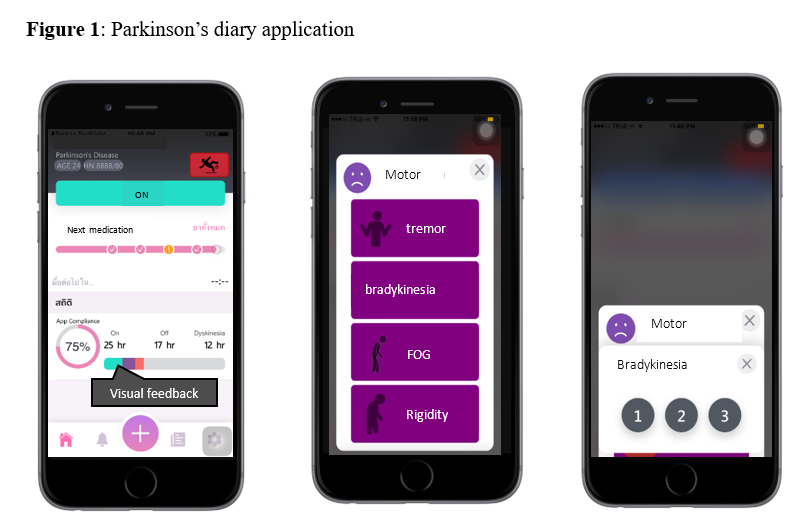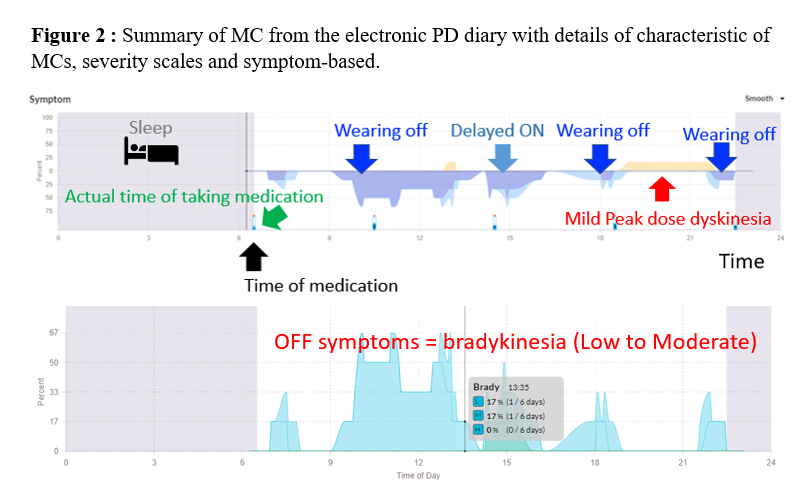Category: Technology
Objective: To determine the feasibility of the simplified and symptom-based electronic PD diary and compare with the standard paper diary.
Background: Motor complications (MC) is one of the most significant difficulties faced by patients with advanced Parkinson’s disease (PD). A paper PD diary is the standard tool for detecting MC in PD patients, but has several limitations such as recall bias and poor compliance. An early electronic version of the PD diary has been shown to be as effective as the paper diary. In order to improve this tool further, a simplified and symptom-based version of this electronic PD diary (e-PD) has been developed by our centre.
Method: A smartphone application with medication alarms, visual feedback assessment and symptom-based identification was developed to evaluate ON/OFF fluctuations and dyskinesia in PD patients with MC (fig 1). A training session for the application was conducted and agreement between each patient and doctor was established for each functional motor states. All participants completed the electronic and the standard PD paper simultaneously for at least 1 week to enable comparison. Primary outcome was the correlation of functional state times between the standard paper and the electronic diary.
Results: A total of 17 non-demented PD patients with MC who were on stable medication regimens were recruited into our study. Total ON/OFF/dyskinesia times were not significantly different between the paper and the electronic versions (p=0.08, 0.06, 0.50, respectively). Percentage correlations of the functional states between the paper and the e-PD diary was 80.2 % (+12.5). Bradykinesia was the most identified symptom by PD patients during OFF periods. Accuracy of the e-PD diary was 81.1%, with a sensitivity and specificity of 89.8% and 68.5% respectively. Patients had higher compliance and satisfaction with the e-PD diary compared to the paper version (p < 0.001).
Conclusion: Our pilot study demonstrated that the smartphone application of the symptom- based electronic PD diary is feasible for assessment of functional states of MC in PD patients with good accuracy compared to the standard paper version, with higher compliance and satisfaction amongst this cohort. Use of this application should enable better identification of MC in patients so appropriate treatment choices can be optimized to match their individual needs.
To cite this abstract in AMA style:
O. Chuapakdee, P. Punyakaew, V. Ratanasirisawad, S. Kongdachalert, C. Winyooviji, R. Bhidayasiri. Feasibility of a simplified, symptom-based electronic diary to improve evaluation of motor and non-motor complications in Parkinson’s disease [abstract]. Mov Disord. 2020; 35 (suppl 1). https://www.mdsabstracts.org/abstract/feasibility-of-a-simplified-symptom-based-electronic-diary-to-improve-evaluation-of-motor-and-non-motor-complications-in-parkinsons-disease/. Accessed February 10, 2026.« Back to MDS Virtual Congress 2020
MDS Abstracts - https://www.mdsabstracts.org/abstract/feasibility-of-a-simplified-symptom-based-electronic-diary-to-improve-evaluation-of-motor-and-non-motor-complications-in-parkinsons-disease/


